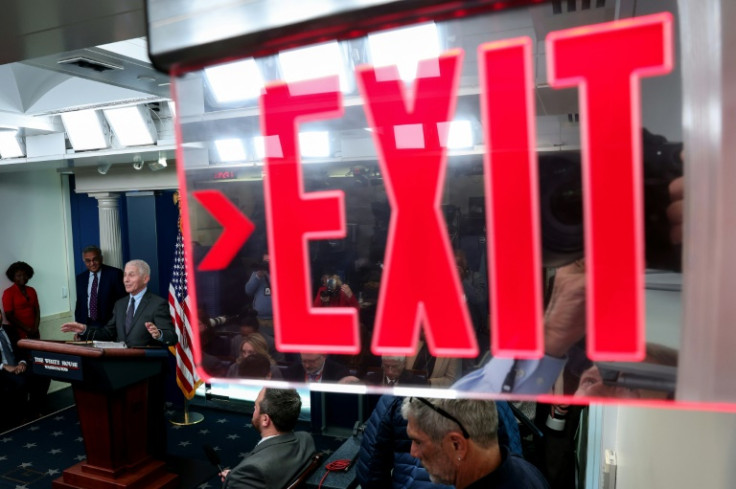In Final Briefing, Fauci Urges Americans To Get Vaccinated

True to form, America's outgoing top infectious disease official, Anthony Fauci, used what may be his final White House appearance Tuesday to convey a simple message.
"Please for your own safety and for that of your family, get your updated Covid-19 shot as soon as you're eligible," said the 81-year-old, hammering home a public health mantra in the face of slow booster uptake.
Vaccines targeting Omicron's sublineages BA.4 and BA.5 have been widely available since summer, but so far only 11 percent of the eligible over-five population in the United States have received them.
Boosting the case, the Centers for Disease Control and Prevention released a study that showed the new shots reduced the risk of infection by around 30 percent among people who had the last of their doses two or three months earlier.
President Joe Biden's Covid coordinator Ashish Jha also announced a "six-week sprint" to increase shots in arms by the end of the year and blunt the impact of an expected winter wave.
Influenza and RSV, which are rebounding after two years of containment during lockdowns, are already adding to the burden on the health care system and could get worse.
But Fauci offered a hopeful assessment about prospects as cold weather settles in.
Between the vaccinated and those with prior infections, he said he hoped "there's enough community protection that we're not going to see a repeat of what we saw last year at this time," even as newer variants emerge.
Fauci will step down next month from his roles in government as Biden's chief medical advisor, as well as director of the National Institute for Allergies and Infectious Diseases, which he has headed since 1984.
The physician-scientist first rose to prominence during the HIV-AIDS crisis, and more recently led the US response to the Zika virus and Ebola.
Reflecting on his time helming America's fight against Covid, Fauci admitted the government could have done a better job at conveying uncertainty early on in the pandemic when advice changed fast.
But he said the most difficult thing he had to deal with was the polarization that had fractured America along political lines.
"When I see people...not getting vaccinated for reasons that have nothing to do with public health, that have to do because of divisiveness, and ideological differences, as a physician, it pains me," he said.
On the proliferation of bad health advice online, he said the "way you counter misinformation and disinformation, is to do whatever you can as often as you can to provide correct information."
Indeed, Fauci often found himself having to contradict then-president Donald Trump's unscientific Covid advice -- such as ingesting bleach to fight the virus -- in clashes that helped turn him into a hated figure on the far right.
Republican lawmakers are expected to grill Fauci when they take control of the House of Representatives in January, but the scientist said he remained undaunted.
"We can defend and explain and stand by everything that we've said so I have nothing to hide."

© Copyright AFP 2024. All rights reserved.





















